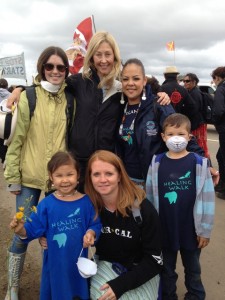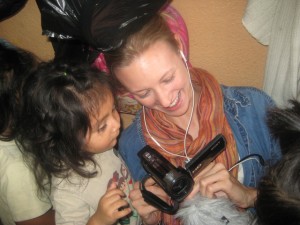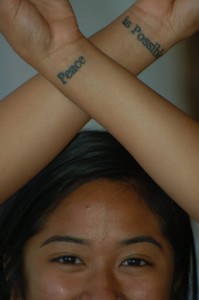 Today is Blog Action Day, the unifying global day of online action when bloggers around the world write about one topic. This year it’s “human rights.”
Today is Blog Action Day, the unifying global day of online action when bloggers around the world write about one topic. This year it’s “human rights.”
The United Nation’s Universal Declaration of Human Rights Preamble begins, “recognition of the inherent dignity and of the equal and inalienable rights of all members of the human family is the foundation of freedom, justice and peace in the world.”
Without human rights, there can be no peace. So this Blog Action Day, Global Exchange Director of Organizing Kirsten Moller explores why young people are so important to creating a peaceful world.

Children and adult activists at the Healing Walk in Alberta, Canada, July 2013 Photo Credit: Global Exchange
Why are Young People So Important to Creating a Peaceful World?
Early this summer I spoke to a “20- something” who told me that she couldn’t understand how in the world we used to organize before computers… I laughed and showed her the printing and phone expenses in the budget that were double what they are now and even talked about rubber cement, clip art and the t-squares we used to use to lay out flyers. Everything seemed so much slower but there was so much promise that we could activate to bring peace and justice to this world.
Cliché has it may sound, each older generation inevitably points out, “Ok, look at how we messed up the world, now it’s your turn to make it better” and the younger generation rolls their eyes at how naïve and self righteous the previous generation is — whether it be the “Baby Boomers” or the “Peace and Love” generation of the Viet Nam era.

Global Exchange Reality Tour to Guatemala, March 2011 Photo Credit: Global Exchange
But here now, I see the tremendous potential of new technology to connect young people from around the world in order to cement those people-to-people ties that are at the root of desire to protect human rights, preserve peace and learn about each other.
We’ve never had greater opportunity to learn about each other — to spend time exploring particularities of different cultures and to care about what is possible. Global Exchange is built on the premise that if we know each other — if we break bread together, share our stories, envision the world we want to live in together and work together across borders we can create peace and preserve human rights around the world.
 Our “What About Peace?”contest asks the question of 14 – 20 year olds and challenges them to answer using their creativity in writing poetry, prose, or painting a picture, taking a photo or making a drawing or graphic. We’ve been so inspired by the vision and beauty of the contest answers that pour in every year from all around the world. Poetry from Zambia, a photograph from the Ukraine, a short story from Pakistan and our first prize winner a Manga style drawing in colored pencil from upstate New York.
Our “What About Peace?”contest asks the question of 14 – 20 year olds and challenges them to answer using their creativity in writing poetry, prose, or painting a picture, taking a photo or making a drawing or graphic. We’ve been so inspired by the vision and beauty of the contest answers that pour in every year from all around the world. Poetry from Zambia, a photograph from the Ukraine, a short story from Pakistan and our first prize winner a Manga style drawing in colored pencil from upstate New York.
Young people are particularly important to guaranteeing peace and human rights because of the intensity and energy they bring to the vision of a world where peace is possible. Some look to find peace from within, some mourn the violence and intolerance in their communities and the world and pledge to take action, others are disaffected from the political process and want to build the new society now where they live.
 But it is heartening to see how many young people wear a peace sign t-shirt (or tattoo!) proudly front and center and who fervently work to create a new world with tolerance and respect, free from violence, racism and want.
But it is heartening to see how many young people wear a peace sign t-shirt (or tattoo!) proudly front and center and who fervently work to create a new world with tolerance and respect, free from violence, racism and want.
With the What About Peace? contest we seek to develop and recognize that deep sense of compassion that is at the core of international human rights, being able to feel deeply about injustice against anyone, anywhere in the world – trusting in the power of people and especially young people to be actively involved in shaping the policies of governments that claim to represent them.
- Do you know someone 14 – 20 years old? Tell them about the contest: www.whataboutpeace.org
- Check out some of the inspiring contest entries on our What About Peace? Facebook page.
We can all benefit from seeing their answers to that question.

